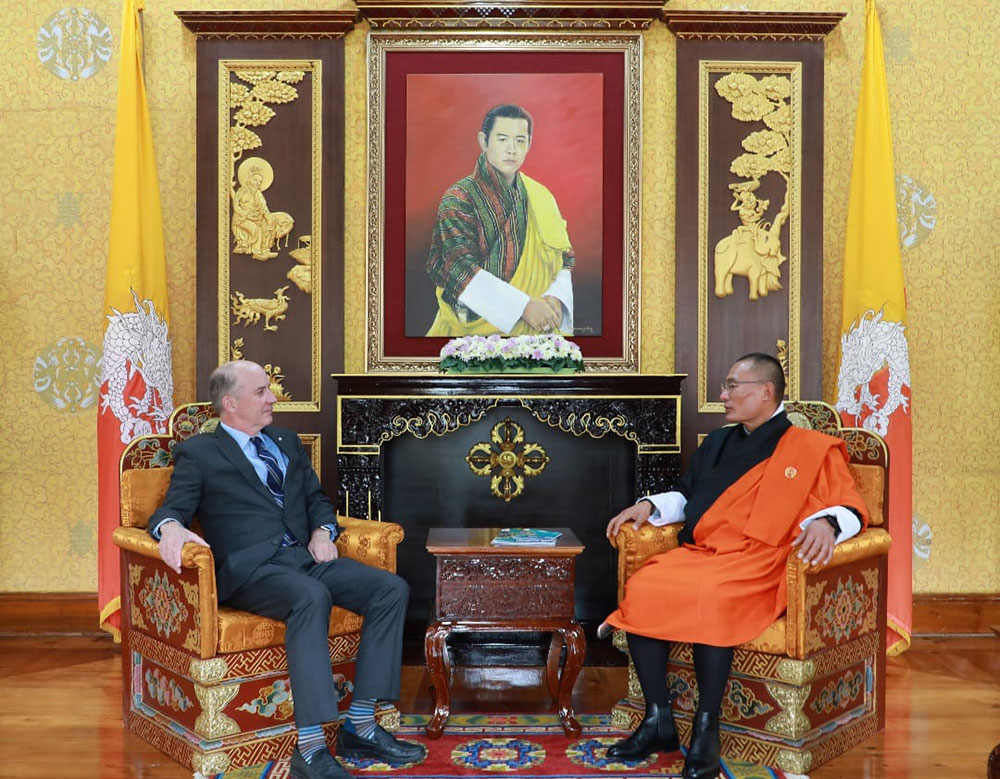Dechen Dolkar
Prime Minister Tshering Tobgay and President and CEO of World Wildlife Fund (WWF), Carter Roberts, launched WWF-Bhutan’s Strategic Plan 2025 – 2029 in Thimphu yesterday.
World Wildlife Fund (WWF)-Bhutan will implement the USD 30 million project for conservation and sustainable development impact for the next five years.
The strategic plan spans five years, from 2025 to 2029, with implementation commencing in July 2024.


WWF-Bhutan will implement the USD 30 million project for conservation and sustainable development impact for the next five years
During the launch, the Lyonchhen said that this project would help the country for sustainable development.
Lyonchhen said that Bhutan is celebrating 47 years of fruitful partnership with WWF-Bhutan.
“I am delighted to see this transition from nature to people for prosperity benefiting more than 130,000 people in the next four years through your partnership in Bhutan which we needed in our rural community,” Lyonchhen said.
Lyonchhen also said that this plan places the responsibility of stewardship on people.
“The launch of this plan gives me faith to continue to conserve what we treasure, while at the same time guaranteeing the prosperity of the people,” Lyonchhen said.
Carter Roberts said the project would support ecotourism in the country for sustainability.
He added that the project will also support how to make use of forests without destroying it.
“I would be partnering with the government of Bhutan in financing conservation of nature which is the fundamental foundation,” Carter Roberts said.
Strategic Plan 2025-2029 marks a significant shift and sets a new conservation pathway for WWF-Bhutan, aligned with the vision of a “Sustainable and just Bhutan for nature and people”.
The plan includes national priorities, community engagement and stewardship, innovative conservation approaches, financing and partnership taking centre stage.
According to WWF-Bhutan recognizing nature’s crucial role in development, WWF-Bhutan is embarking on a strategic direction focused on sustaining a resilient natural ecosystem, preserving biodiversity, fostering environmental stewardship, and promoting a nature-based economy for human well-being and economic growth.
The plan emphasises conservation for “people, prosperity, and progress”, aiming for harmonious co-existence of nature and communities.
Understanding the complex drivers of environmental degradation, the plan adopts a people-centred, integrated approach delivered through diverse conservation financing mechanisms.
The other strategies includes cultivating stewardship, implementing integrated programmes, pursuing conservation financing shifts and securing connected transboundary Landscapes.
It states that through an integrated programme approach, WWF-Bhutan hopes to support national priorities by enabling opportunities for collaboration with the Government of Bhutan and a diverse range of partners enabling innovative projects and solutions.
WWF-Bhutan mentioned that by engaging communities and promoting nature-based solutions, the plan aims to enhance societal, economic, environmental, and biodiversity benefits, aligning with Bhutan’s development goals.
Furthermore, WWF-Bhutan, in collaboration with other WWF offices in the region, will work to secure interconnected landscapes across the Eastern Himalayas to safeguard the rich biodiversity and foster resilient ecosystems and economies.
Fostering ownership and responsibility towards nature for long-term biodiversity conservation will constitute a critical approach taken by WWF-Bhutan to deliver its new plan.


